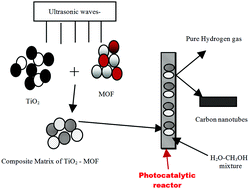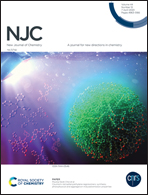Innovative approach for the production of carbon nanotubes (CNTs) and carbon nanosheets through highly efficient photocatalytic water splitting into hydrogen using metal organic framework (MOF)-nano TiO2 matrices as novel catalysts
Abstract
The production of carbon nanotubes (CNTs) is usually carried out either via catalytic decomposition of methane or by recrystallization of bio-char species obtained by pyrolysis of solid wastes. Both techniques are generally executed at high temperatures and consume long time. Thus, these two methodologies are not considered to be economically feasible. This research work reports a facile and cost-effective new route for the generation of CNTs via photocatalytic conversion of water to hydrogen. Specifically, water splitting photochemical reaction using a metal organic framework (Cr-MIL-101) and TiO2 nanoparticles was demonstrated. The coupling of the aforementioned semiconductors, as novel matrices, to improve the photocatalytic reactivity toward hydrogen production in the presence of methanol, as a hole scavenger, under visible light was performed. The results revealed the high-yield evolution of H2 showing a maximum purity of 99.3% with the in situ formation of carbon nanotubes over the surface of the Cr-MIL-101/TiO2 binary system that was obtained by sonication. The use of this binary photocatalyst, however, as a physical mix could produce nano-carbon species while simultaneously producing hydrogen rich syngas. The production of H2 gas that was simultaneously stored was noted when Cr-MIL-101 was used individually as a photocatalyst. These data provide new advances in the field of water splitting by introducing promising candidate materials for the production of pure hydrogen as a clean fuel.



 Please wait while we load your content...
Please wait while we load your content...